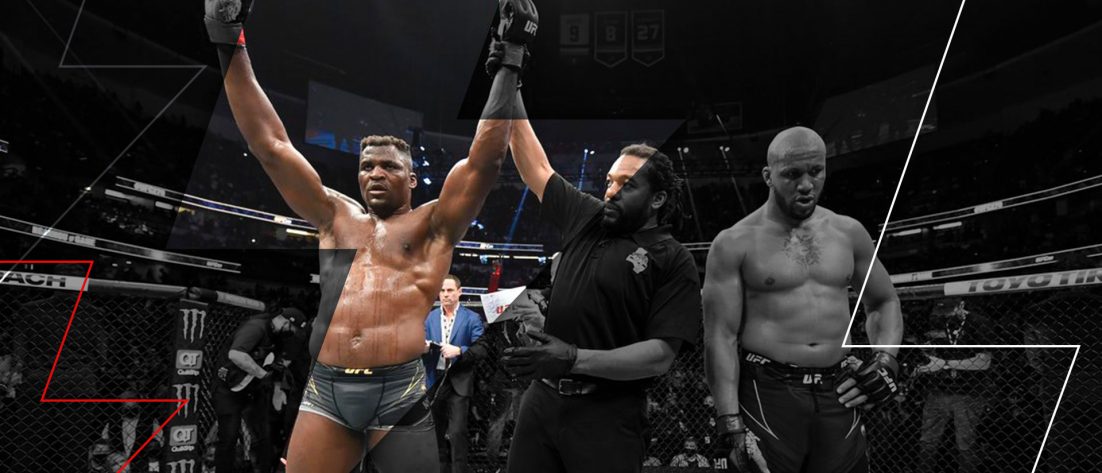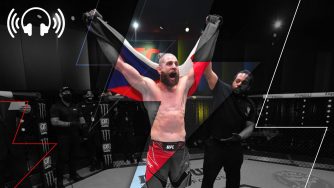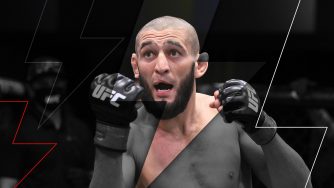In retrospect, maybe UFC President Dana White should have just swallowed his pride and put the heavyweight belt around Francis Ngannou’s waist. It wouldn’t have been so hard, would it? To stand there like a good sport and at least pretend that, as the promoter of the UFC 270 main event, he was not for one fighter and against the other? Maybe he could have even, I don’t know, showed up at the post-fight press conference and congratulated the UFC heavyweight champion. Or at least just showed up.
He didn’t do that, though. And in not doing it, White has further cemented the narrative that this wasn’t just Ngannou vs. Ciryl Gane at Saturday’s pay-per-view – it was Ngannou vs. the UFC. For now, it seems as if Ngannou has won. And of all the things to have made the critical difference, who’d have thunk it would be the big fella’s wrestling skills?
For the first ten minutes of that fight, Ngannou’s big bet on himself seemed like it might backfire. He’d opted to fight out his UFC contract, to test the waters of free agency, and the way Gane was chipping away at him it looked like he was about to do it on the heels of a loss.
Then came the takedowns, and you could almost see the lightbulb snapping on. Holy shit, Ngannou seemed to realize, this guy has worse wrestling than I do. What great news.
That’s not saying it wasn’t a gutsy and smart performance by Ngannou, because it was. The guy who seemed to be the ultimate one-trick pony showed that he also had a plan B in his pocket, and damned if he didn’t pull it out right when he needed it. After the fight he revealed that he’d suffered a serious knee injury before the fight, which only made it more impressive that he’d stayed in it and found a way to win. If that knee injury also gives him more cover for sitting out while he waits for his UFC contract to expire, well, that’s probably not the worst thing that could happen.
Now things are about to get tricky. Ngannou has said he’s unhappy with both his pay and his treatment in the UFC. The aftermath of UFC 270 showed why he has valid complaints about both. His disclosed payout for the event (prior to any pay-per-view cut) was only $600,000, also known as an amount of money that wouldn’t even roust a boxing heavyweight champion out of bed in the morning.
Then there’s the whole lack of respect thing. The head of the company reacted to Ngannou’s win like it was part insult and part disaster. Ngannou said before this fight that he didn’t feel like he even had a promoter, and White did everything he could to prove him right. Fleeing the cage after the fight and then no-showing the press conference sent a pretty clear message: your win is our loss. And that doesn’t exactly bode well for contract negotiations.
Ngannou now seems to have three options, presented here in order of how likely they seem at the moment: 1) Sit out a year and then try his luck in boxing, 2) Sit out a year and then sign with another MMA promoter, possibly with a more flexible contract that also lets him box on occasion, or 3) re-sign with the UFC.
You’d think that third option would be a real priority for the UFC. Ngannou just defended the heavyweight title after a week in which he was written up in the NY Times, featured on the cover of ESPN the Magazine, and interviewed as a guest on “The Daily Show.” He’s in the new Jackass movie, for crying out loud. This guy is clearly a star, and you can tell by the fact that he’s getting attention from corners of the media and entertainment worlds that normally don’t even recognize that MMA is a thing that’s happening on this planet.
But the UFC seems focused on a bigger picture. Obviously, it would be better to keep the heavyweight champion than to lose him. But if the cost of keeping him is higher guaranteed pay and/or a less restrictive contract, the UFC might see that as a dangerous precedent. If you let Ngannou set the terms of his contract or hold you up for more money, what next? Soon every champion will demand to be paid what he’s worth and be treated with respect. Can’t have that.
And realistically, the UFC could absolutely let Ngannou walk and not suffer too much for it in terms of revenue. This is one of the benefits of getting paid by TV partners whether the pay-per-views sell or don’t. The only real danger is if Ngannou leaves and ends up living his best, most prosperous life outside the UFC. Because that? Other fighters might actually notice that.
Like people in a lot of career fields, pro fighters have a difficult time imagining a totally different world. This is the way MMA worked before they got here, so they assume it’s the only way it can work. For a lot of them, the message is reinforced often by their managers. Of course you don’t deserve to be paid well for fighting on a UFC pay-per-view. You’re new here and that’s just not how it works!
But if they see it for themselves – if they watch someone like Ngannou stand up for himself and get paid better and treated better – maybe that’s different. Maybe it all starts to seem less theoretical and way more possible.
Of course, it’s also possible that Ngannou is a very special case. Not every UFC champion is a GQ-looking motherfucker with an incredible personal story, natural charisma, and the power of the gods in his fists.
But while there may be only one Ngannou, that doesn’t mean there aren’t others who could benefit from fighting out their contracts and exploring life outside the UFC. And while it might not impact the UFC a ton to lose one Ngannou, there’s more than one way for the heavyweight champ to establish a precedent.
Hey, if you made it this far and didn’t hate it, you should consider signing up for the Co-Main Event Patreon. There you can comment on these posts, argue with other people about them, even call us names or whatever. You also help support the CME and keep the discourse free and unfuckingfettered.









